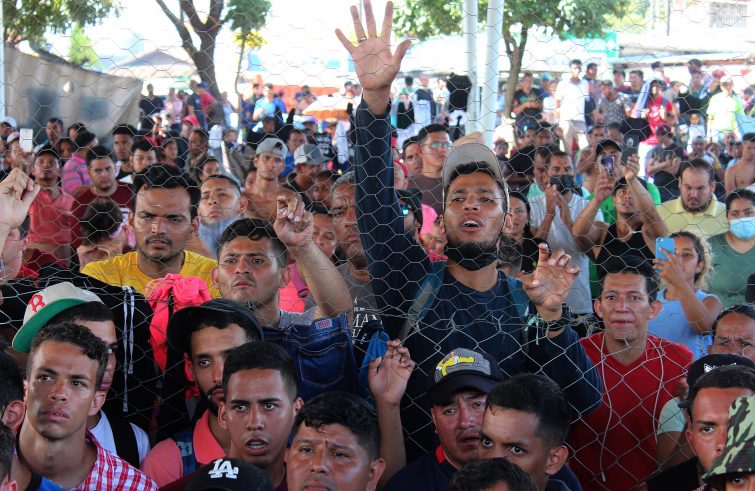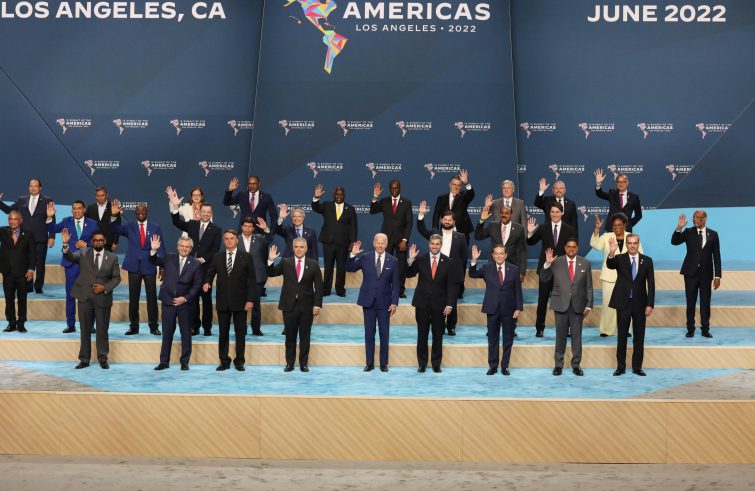
(from New York) They decided to leave from Tapachula, in the Mexican Chiapas on Monday, only a few hours before Mexico’s President, Andrés Manuel López Obrador, announced that he would not be attending the Summit of the Americas, which wrapped up in Los Angeles on Friday.
They set out in 14,000 to protect each other and to raise awareness on their plight with the media and most of all with political leaders gathered in Los Angeles to attend the Summit of the Americas, during which the Los Angeles Declaration was signed
This document will henceforth regulate common migration policies in the Americas. Accordingly, political leaders pledge to “protect the safety, dignity, human rights and fundamental freedoms of all migrants”, they reaffirm that migration “should be a voluntary, informed choice and not a necessity.”
Many of them were unaware of the terms of this agreement when they set off, many more presumably were not even informed that political leaders were attending the meeting in California. Oblivious to it all were surely the 3,000 children marching with them to the US border, some wearing plastic ponchos against the heavy rainfall or were bundled up in blankets in their parents’ arms.
Luis García Villagrán, coordinator of the caravan and director of the Center for Human Dignification, said that
at least 126 pregnant women and more than 70 physically disabled persons were marching alongside thousands of migrants.
The vast majority came from Venezuela, people from Central America, Haiti and Cuba also joined them on foot. Eymar was marching with them. He used to serve as state police officer in Venezuela. In January, he and his extended family created a group chat where, for three months, they shared news about goods and medicine shortages, high food prices and persistent power outages. The texts eventually developed into a plan to leave the country, and so Eymar sold his car and other belongings to pay for the two-week odyssey from Venezuela to Mexico, including via the stretch of mountainous rainforest straddling Colombia and Panama. He said it was the most difficult part of the journey for his wife, but it was harder to watch their three children suffer, with their three-year-old coping with the challenging trail on his stroller.

Eymar is now walking together with his 17 relatives along the feeder road that will bring them to the US border.
They are joined by all those migrants and asylum seekers who have grown weary of the Mexican government’s strategy of containing migrants in the south of the country, making their lives even more miserable.
Many of them have incurred debts in order to make this journey, and given the meagre job opportunities in the region, they are overwhelmed with despair. Equally overwhelmed are asylum-seeker agency workers. In fact, the new policies on travelling to the north of the country stipulate the approval of an official request before embarking on the journey, in the absence of which the migrants will be stopped by immigration officers and sent back to their country of origin. Hence raising awareness at the Summit of the Americas became crucial, even by means of a caravan.
Migrants stopped at the border in the last two years run in the hundred thousands, with the US Border Protection Agency reporting more than 1.7 million people from October 2020 to September 2021 and an additional 1.3 million from October 2021 to April 2022.
“No nation should alone bear the responsibility of managing a historic surge in migration across the Western Hemisphere”, US President Biden said on Friday while co-signing the Declaration with 19 Latin American and Caribbean leaders. As per the Declaration, the signatories to the agreement pledge to expand legal pathways for migrants and refugees and to provide fresh funding for hosting them in transit countries. Signatories include Mexico, El Salvador, Guatemala and Honduras, whose presidents did not to participate out of protest against the decision not to invite Cuba, Venezuela and Nicaragua.
The pact includes commitments from Mexico to launch a temporary labour programme for 15,000 to 20,000 workers from Guatemala. Eligibility for that programme will be expanded to include Honduras and El Salvador in the medium term.
The U.S. administration plans to commit $314 million in humanitarian aid and to provide billions in existing development bank funding to help promote new programs to accept migrants and refugees in countries such as Ecuador and Costa Rica. It will provide visas to 11,500 nationals of northern Central America and Haiti. Canada, too, will provide $26.9 million for the 2022-23 fiscal year for migration management and humanitarian aid, and Spain is pledging to double the number of labour pathways for Hondurans.
“All I want is a future for my children,” Eymar said to ABC news reporters, and along with him, so do the approximately 14,000 people walking towards the U.S. border.











